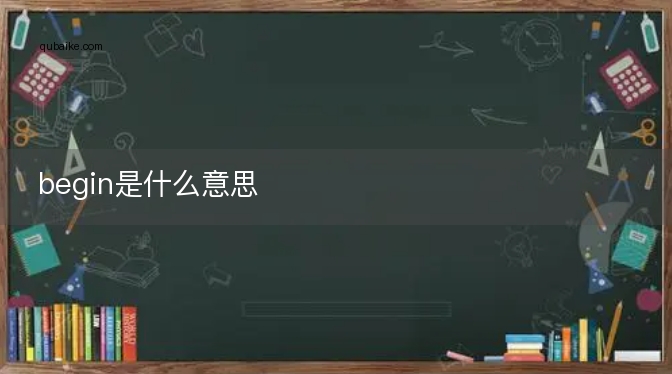
begin
详细释义
- 开始
- 创始,创建,创办
- 着手,开始行动,开始进行,启动
- 作开头部分,作…的开端
- 动手,下手
- 开场,开场白,开始讲话
- 发动,挑起
- 动工兴建
- 开始存在,始于,源于,形成,产生,出现,呈现
- 使开始,使形成,使产生
- <口>一点也不,丝毫(不),根本(不)[通常与否定词连用,并后接不定式]
- ALGOL中的一个过程定义符
双解释义
- vt. & vi. 开始; 着手 start; take the first step
英英释义
- Israeli statesman (born in Russia) who (as prime minister of Israel) negotiated a peace treaty with Anwar Sadat (then the president of Egypt) (1913-1992)
- take the first step or steps in carrying out an action;
"We began working at dawn" "Who will start?" "Get working as soon as the sun rises!" "The first tourists began to arrive in Cambodia" "He began early in the day" "Let's get down to work now"
- have a beginning, in a temporal, spatial, or evaluative sense;
"The DMZ begins right over the hill" "The second movement begins after the Allegro" "Prices for these homes start at $250,000"
- set in motion, cause to start;
"The U.S. started a war in the Middle East" "The Iraqis began hostilities" "begin a new chapter in your life"
- begin to speak or say;
"Now listen, friends,"
- be the first item or point, constitute the beginning or start, come first in a series;
"The number `one' begins the sequence" "A terrible murder begins the novel" "The convocation ceremony officially begins the semester"
- have a beginning, of a temporal event;
"WW II began in 1939 when Hitler marched into Poland" "The company's Asia tour begins next month"
- have a beginning characterized in some specified way;
"The novel begins with a murder" "My property begins with the three maple trees" "Her day begins with a workout" "The semester begins with a convocation ceremony"
- begin an event that is implied and limited by the nature or inherent function of the direct object;
"begin a cigar" "She started the soup while it was still hot" "We started physics in 10th grade"
- achieve or accomplish in the least degree, usually used in the negative;
"This economic measure doesn't even begin to deal with the problem of inflation" "You cannot even begin to understand the problem we had to deal with during the war"
- begin to speak, understand, read, and write a language;
"She began Russian at an early age" "We started French in fourth grade"
组词搭配
- begin a book开始写书
- begin a course读一门课
- begin a dynasty开创朝代
- begin a new book开始读一本新书
- begin a new business开始从事一项新工作
- begin a new offensive采取新的攻势
- begin class开始上课
- begin English开始学英语
- begin experiment开始实验
- begin march开始长征
- begin offensive开始进攻
- begin production开始生产
- begin school开始上学
- begin service开始服务
- begin the meeting开始开会
- begin the world开始谋生,踏入社会
- begin translations开始翻译
- begin work开始工作
- begin dark变黑
- begin smoky开始烟雾缭绕
- begin afresh重新开始
- begin again重做
- begin appealingly有趣地开始
- begin argumentatively在争辩中开始
- begin auspiciously吉利地开始
- begin clumsily笨拙地开始
- begin contemporaneously同时开始
- begin earnestly认真地开始
- begin ecstatically入迷地开始
- begin euphemistically委婉地开始
- begin eventually终于开始
- begin hesitatingly犹豫不决地开始
- begin immediately马上开始
- begin insidiously不知不觉地开始
- begin jerkily紧急开始
- begin mechanically机械地开始
- begin methodically有条理地开始
- begin ostensibly明显地开始
- begin rapturously欢天喜地地开始
- begin resentfully愤恨地开始
- begin romantically浪漫地开始
- begin sarcastically嘲讽地开始
- begin savagely凶猛地开始
- begin serially连续地开始
- begin seriously认真地开始
- begin surreptitiously秘密地开始
- begin wistfully渴望开始
- begin zealously积极地开始
- begin as以(某职业)开始自己的生涯
- begin as a factory worker以当工人起家
- begin at从…开始
- begin by以…开始
- begin in在…时候开始
- begin in February始于二月
- begin on〔upon〕着手
- begin on a job着手做一项工作
- begin on a new book开始写一本新书
- begin with从…开始
- begin with the book从这本书读起
- begin with the work先做这项工作
例句
- The meeting will begin at nine.会议将在九点开始。
- I have to begin with an apology.我得首先表示歉意。
- When did you begin learning English?你何时开始学习英语的?
- The leaves begin to fall when autumn comes.秋天来临时, 树叶开始落下。
- She's begun on a new novel.她已开始着手写一本新小说。
词语用法
- begin的基本意思是“开始”,用作及物动词时,指做某事的第一个步骤、第一个行动或第一部分,强调某种状态的“开端”,特别是较缓慢的开端。begin也可用作不及物动词,以活动、工作、机械为主语,表示开始动或处于动的状态中。 begin用作及物动词时,后接名词、代词、动名词、动词不定式或含有疑问词的动词不定式作宾语。begin还可用作系动词,后接形容词作表语。 begin可用其现在时表示未来的事,也可用其进行时表示“渐渐开始”“即将开始”等。 begin是非持续性动词,不能与表示一段时间的状语连用。但可与表示时间点的状语连用。 begin的现在分词beginning还可以在句中作定语或状语。 to begin with作“首先,起初”解,用作插入语,可放在句首、句中,也可放在句末。 begin可用于被动结构,但用作主动结构时更合习惯,尤其表示“(某事)开始”时。
常见错误
- 旅行始于北京而结束于西安。
误 The journey begins from Beijing to Xi'an.
正 The journey begins at Beijing and ends at Xi'an.
析begin的基本意思就是“从头开始”,因此在表示“从…开始”时不可再接from或from...to。
电影开演半个小时了。误 The film has begun for half an hour.
正 The film has been on for half an hour.
析begin是瞬间动词,用于完成时态时,不可以和表示一段时间的时间状语连用。
该开会了。误 It's time beginning the meeting.
正 It's time to begin the meeting.
析 习惯上,It's time后不跟begin的动名词形式。